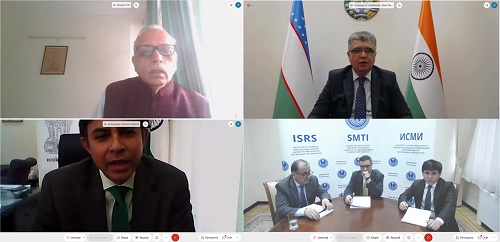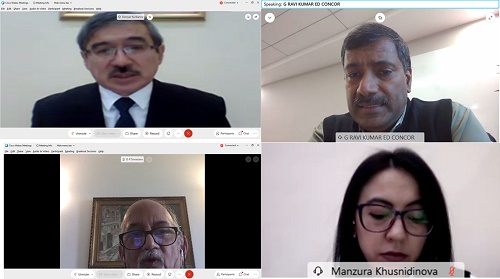India and Uzbekistan share close historical and cultural links dating back to ancient times. Uzbekistan is India’s extended neighbour and a strategic partner. This relationship is multi-faceted and includes cooperation in political, trade-economic, education, science and technology, industry, agriculture, civil aviation and defence sectors. Vivekananda International Foundation (VIF) organised a Webinar on ‘Indo-Uzbek Relations’ on December 4, 2020, to discuss the current status of Indo-Uzbek relations and exploring the avenues for further cooperation in connectivity, energy security, regional security and strategic dimensions.
Two leading think tanks from Uzbekistan participated in this Webinar. The Institute for Strategic and Regional Studies (ISRS) under the President of Republic of Uzbekistan was led by Director Dr. Eldor Aripov, and the Centre for International Relations Studies (CIRS) was led by Director Mr. Doniyor Kurbanov. Dr. Arvind Gupta, Director, VIF, delivered the opening remarks, followed by Dr. Eldor Aripov. H.E. Mr. Dilshod Akhatov, Ambassador of the Republic of Uzbekistan to India and H.E. Mr. Manish Prabhat, Indian Ambassador to Uzbekistan also delivered their remarks at the Webinar. Presentations were made by Mr. Doniyor Kurbanov and Mrs. Manzura Khusnidinova (CIRS) and Mr. Rustam Khuramov, Mr. Alisher Kadirov, from ISRS. Amb. D. P. Srivastava, Distinguished Fellow, Vivekananda International Foundation, also made a presentation on regional connectivity (INSTC & Chabahar).

Salient Points that emerged from the discussion are as follows:-
The Coronavirus Pandemic
- The coronavirus pandemic has impacted global politics and the economy immensely. The task of economic recovery is going to be long and arduous. Health and food security has become the top concerns for most countries.
- Besides its negative impact and trends, the pandemic has provided new opportunities for cooperation. India provided medicines and medical equipment to over 150 countries during the pandemic, including the Central Asian Republics (CARs).
- The pandemic has shown that genuine and effective global cooperation is needed for advanced preparedness in combating a pandemic situation like COVID-19. Building efficient health infrastructure is emerging as a priority area of Indian diplomacy. Similarly, Uzbek, President at the 75th UN General Assembly, has also proposed adopting the ‘International Code of Voluntary Commitments of States during pandemics.’ This is a common ground for further cooperation between the two countries.
India-Uzbekistan Relations
- Indo-Uzbek relations are intertwined by shared history and culture, and these common bonds provide a factual basis for bilateral engagement. Consistent high-level bilateral visits have given impetus to the bilateral relations.
- Uzbekistan’s engagement with its neighbours, regional countries and internationally has grown in the recent past. India is also stepping up its cooperation with the Central Asian countries by having India-Central Asia summit level meetings. The Second India-Central Asia Dialogue was held recently following a virtual format where India has extended a 1 billion USD Line of Credit (LOC) for priority development projects in energy, healthcare, connectivity, IT, agriculture, education, etc.
- In 2017, India’s official entry to the SCO as a full member state made it more visible in the Central Asian Region and provided a crucial common platform to discuss and develop issues of mutual benefits. As a chair of the Council of Heads of Governments of the Shanghai Cooperation Organization (SCO), India has proposed cooperation in traditional medicine, start-ups, and culture, among many other things. These are also common areas of cooperation between India and Uzbekistan.
- Several agreements in security, investment, trade, science and technology, innovation, military, education, agriculture, pharmaceuticals, and culture were signed. For the last 2-3 years, an active and mutual exchange between Uzbekistan and India at all levels has taken place.
- There is a huge potential in enhancing defence cooperation through joint ventures in defence production, defence training to larger groups of cadets and border management. Counter-terrorism is another such area, where the goals of the two nations collaborate, bilaterally and within SCO’s Regional Anti-Terrorist Structure (RATS) based at Tashkent.
- Educational cooperation between India-Uzbekistan has also witnessed development recently. Indian universities such as Sharda and Amity have opened their campuses in Uzbekistan, while Bukhara Medical institute has opened one of its branches in Noida International University.
- Cooperation between Indo-Uzbek think tanks is also gradually developing.

Afghanistan as a Common Concern
- A significant step in Tashkent’s foreign policy is a proactive approach towards Afghanistan. Uzbekistan has expanded bilateral ties with Afghanistan and actively engaged in multilateral efforts to resolve the Afghan problem in the recent past. In March 2018, Tashkent initiated and hosted a high-level international conference on Afghanistan, “Peace Process, Security Cooperation and Regional Interaction,” that made an essential contribution to the peace process.
- Uzbekistan’s role in the reconstruction and development of Afghanistan is highly significant. India and Uzbekistan share the goal of bringing peace and stability to Afghanistan. To this end, India has rendered 3 billion US dollars worth of assistants to the country. India is deeply concerned about the ongoing violence in the country. It is obligatory to ensure that the gains achieved by Afghan people in the last two decades in democracy, education, and participation are not dissipated.
Indo-Uzbek Relations through the Prism of Increased Regional Cooperation in Central Asia
- Uzbekistan’s foreign policy has undergone a total transformation under the pragmatic leadership of President Shawkat Mirziyoyev. The new regime in Uzbekistan has shown incredible perseverance and accountability for creating a favourable environment in the country and playing a constructive role in regional integration in Central Asia. Intra-regional trade and movement of people have increased, and border crossings have been smoothening.
- President Mirziyoyev’s efforts to intensify regional integration in Central Asia have become a success. The First ‘Consultative Meeting’ of the Heads of all the Central Asian Republics was held in Nur-Sultan, Kazakhstan’s capital city, on March 15, 2018. The Second ‘Consultative Meeting’ was held on November 29, 2019, in Tashkent, Uzbekistan. In these meetings, a wide range of topics related to regional development and ways to smoothen bilateral and multifaceted transactions were discussed, and subsequently, a variety of suggestions came out with the line of the discussions.
- The ongoing efforts to create a positive regional environment in Central Asia are beneficial for India’s engagement with the region. It will expedite bridging the connectivity gap between India and Central Asia and enhance cooperation in trade and economic sectors.
Trade and Connectivity
- Trade between the two countries is much below the potential, which cannot be improved without ensuring connectivity. Bringing connectivity between India and Central Asia is central to India’s Central Asia Policy. India’s connectivity projects in the region, the International North-South Transit Corridor (INSTC) and the Chabahar Agreement can help develop land access to Uzbekistan. However, Uzbekistan is currently not a member of the INSTC. India’s accession to the Ashgabat Agreement, where Uzbekistan is already a member, is also crucial in this regard.
- India has invested in Chabahar Port in Iran, which will serve as a gateway to Afghanistan, Central Asia, and Eurasia. Uzbekistan is also a stakeholder in improving connectivity with Iran. In this area, Uzbekistan and India are playing important roles. Uzbekistan played an active role in making India a part of the Ashgabat Agreement, establishing an international transport and transit corridor to which India was admitted in 2018. The corridor is expected to smooth the transportation of goods between Central Asia and the Persian Gulf. India expects it to function as a gateway to Central Asia in addition to Chabahar Port.
- India invited Uzbekistan to make use of the Chabahar port, which is crucial in granting Uzbekistan access to a deep-water port. Uzbekistan has invited India to join the rail link of approximately 650 km, connecting the Afghan cities of Mazaar-e-Sharif and Herat, which may later be extended to Kabul.
- Amid the coronavirus pandemic, Iran has launched a pilot project for the Iran-Afghanistan-Uzbekistan road transit corridor. The effective use of this highway’s transit potential can become an essential structural link of the North-South international transport corridor. India and Uzbekistan’s partnership in this regard are also crucial.
- Indian government is providing facilitation to entrepreneurs to do business through Chabahar. Also, the Iranian government has given concessions on customs duties, especially on food imports.
Recommendations
- There is an urgent need to develop cooperation in promoting historical and cultural heritage between India and Uzbekistan. Cooperation between Museums, archives and libraries can be helpful in this regard.
- Yoga and Ayurveda are gaining global recognition and popularity, and acceptance. India and Uzbekistan can promote cooperation in these areas.
- India’s pharmaceutical companies should establish their manufacturing base in Uzbekistan and increase medical supply to the region. Due to the consuming markets, there is also a need to create regional medical centres in Uzbekistan.
- India-Uzbekistan cooperation in telemedicine, cyber-security and distance technologies.
- GPS, satellite information and remote sensing are the significant areas for bilateral cooperation.
- Cooperation in developing Digital Economy is highly required. Collaborative digital platforms can be built.
- India and Uzbekistan need to coordinate their policies concerning Afghanistan for greater cooperation.
- At the track-2 level, a trilateral dialogue on Afghanistan should be initiated with the participation of India (VIF), Uzbekistan (ISRS) and a think tank from Afghanistan (to be identified).
- Being two major stakeholders, both India and Uzbekistan, should ensure that women and human rights in Afghanistan should be encouraged.
- Trilateral dialogue between Iran-India and Uzbekistan to discuss the logistics at Chabahar is needed.
- There is already infrastructure in place to substantially use the potential of Chabahar and INSTC.
- Indian Government subsidiary CONCOR can facilitate container movement at Chabahar between India and Uzbekistan and further to other CARs.
- The government should incentivize the private sectors to make more use of the INSTC and should also facilitate Baking channels, Insurance facility, and shipping support.
- The signing of the India-Uzbekistan Preferential Trade Agreement (PTA) should be accelerated to promote and protect bilateral trade.
- Air corridors should be developed to facilitate the movement of perishable items.
- Potential for promoting tourism, especially Medical tourism, are the sectors of cooperation that remained less explored.
- Bollywood’s popularity in Uzbekistan can also add to the cultural cooperation by opening up Indian art and aesthetic centers in Uzbekistan and vice-versa.
- Joint efforts at expediting the procedure of defence production and joint military exercises and training are required.
- Following the lines of Indo-Uzbek think tank cooperation, India-Central Asia think tank forum should be formed.
Strengthening of Inter-Parliamentary cooperation between India and Uzbekistan.
The Webinar generated good interest, and there were many points of discussion.

_0.jpg)





Post new comment